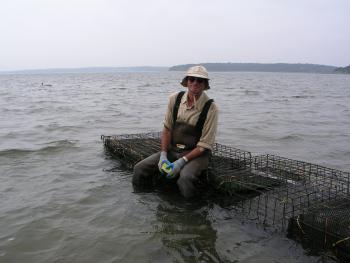David Slack

Cape Cod Shellfish Industry Interviews
This is a collection of 15 interviews conducted in 2007 with people on Cape Cod who are involved in the shellfishing industry. Five people who are employed by towns to manage and regulate shellfish (Shellfish Officers), seven people who own shellfish aquaculture businesses (Growers), and four people who harvest wild shellfish commercially (Commercial Harvesters) were asked the question “What does shellfishing mean to you?”. From that starting point, questions centered on how the individual got into shellfishing and then what they thought the future of shellfishing might be.
The interviews were conducted by Sandy Macfarlane, a retired shellfish biologist and conservation administrator for the town of Orleans. The work was done under a contract with the Barnstable County Cooperative Extension Marine Program. Each interview is summarized into a written document that varies from 807 to 1557 words long and has an accompanying photograph. The interviews represent geographic, age, gender, and experience diversity as well as shellfish species diversity. All interviewees are year round residents of Cape Cod. One theme that emerged from this work is that shellfishing remains an important component of the Cape Cod economy and culture and those who are involved are concerned about its continued presence.
David Slack is a shellfisher on Cape Cod, a region known for its robust shellfishing industry. His career trajectory took a significant turn when he transitioned from a conventional desk job to the more hands-on and physically demanding practice of shellfishing. This change not only reflects a personal choice but also underscores a broader narrative of individuals seeking livelihoods connected to their community and environment. Slack's experience in the industry provides insight into the operational challenges faced by shellfishers, the evolving nature of shellfishing practices, and the critical role of external support in the form of government intervention and scientific research. His perspective is particularly valuable in understanding the complexities of shellfish farming and the pressures on wild shellfish populations. Slack's commitment to the shellfishing vocation is evident in his advocacy for the preservation of the industry, which holds significant economic and cultural weight in the Cape Cod area.
Scope and Content Note
The interview with David Slack offers a comprehensive examination of the shellfishing industry on Cape Cod, highlighting its economic and cultural significance. He discusses beginning his career at a desk job in Boston, moving to Cape Cod in the 1970s, and starting off in shellfishing with harvesting bay scallops, then digging clams and harvesting blue mussels. He discusses the decline of the wild shellfisheries and the beginning of aquaculture operations in Pleasant Bay, the role of Barnstable County Extension agents and the Research Farm Network program, problems with tunicates, and the issues of supply and demand with aquaculture and wild fisheries. Slack shares his personal journey from office work to the shellfishing profession, providing a narrative that encapsulates the broader industry's challenges and the dynamic changes it has undergone. The interview delves into the difficulties shellfishers face, including environmental and regulatory hurdles and the importance of adaptive strategies in shellfish farming. Slack emphasizes the pivotal role of government support and scientific research in enhancing the industry's sustainability and productivity. He voices concerns regarding the decline of wild shellfish populations, a critical issue that underscores the need for concerted conservation efforts. The content of the interview is rich with Slack's reflections on the past, present, and future of shellfishing, his call to action to protect the industry, and his insights into the interplay between human activity and marine ecosystems. This interview serves as a valuable resource for understanding the intricacies of shellfishing on Cape Cod and the passionate individuals dedicated to its continuation.
Please Note: The oral histories in this collection are protected by copyright and have been created for educational, research and personal use as described by the Fair Use Doctrine in the U.S. Copyright law. Please reach out Voices@noaa.gov to let us know how these interviews are being used in your research, project, exhibit, etc. The Voices staff can help provide other useful resources related to your inquiry.
The NOAA mission is to understand and predict changes in climate, weather, oceans, and coasts, to share that knowledge and information with others, and to conserve and manage coastal and marine ecosystems and resources. The Voices Oral History Archives offers public access to a wide range of accounts, including historical materials that are products of their particular times, and may contain offensive language or negative stereotypes.
Voices Oral History Archives does not verify the accuracy of materials submitted to us. The opinions expressed in the interviews are those of the interviewee only. The interviews here have been made available to the public only after the interviewer has confirmed that they have obtained consent.
